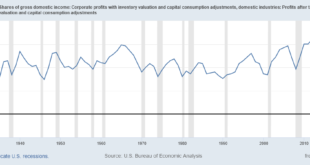Till today there is a widespread presumption that Neoliberalism (NL) is the dominant political-economic paradigm in the West but also in the greater part of the world. This paper argues that this is not so and that since the beginning of the 21st century NL has fallen from grace and has been replaced by the equally conservative New Keynesianism (NK) with the New Macroeconomic Consensus (NMC). The fundamental sign of this transition is the widespread and growing state economic...
Read More »Here we are
from Peter Radford Random thoughts on day one of America’s war on the world. This is my way of summarizing, it is not definitive by any means! I wrote in haste. Here’s a quote to get us started: “What made fascism attractive in Europe and elsewhere was its combination of national autarkic aims, militarism, statism, and a glorification of technology, which suited the inclinations and interests of military rules and modernizing autocrats.” [Osterhammel and Peterson; “Globalization, A...
Read More »The Geology of Economics?
from Peter Radford This is something I need to get off my desktop. It’s just for fun … Asymmetry is the very beginning and end of an economy. It’s the bumps that matter. Explain them and you explain the economy. After all the very notion of exchange presumes differences between those involved, and difference is just another way off saying asymmetry. Sweep the bumps away with a broad brush of supposedly superb logic and you eliminate the very object of your study. That is if your...
Read More »Capitalism and Democracy: The market is far more flexible than Christopher Caldwell imagines
from Dean Baker New York Times columnist Christopher Caldwell devoted his Thanksgiving piece to describing the German sociologist Wolfgang Streeck’s views on capitalism and democracy. I have not read much of Streeck’s work, but as recounted by Caldwell, he gets many of the basic facts about the U.S. economy badly wrong. According to Caldwell’s account, capitalists were willing to sacrifice profits in the decades after World War II for stability. This meant less dynamism but allowed...
Read More »AJR, Nobel, and prompt engineering
from Peter Radford Well done AJR. A prize deserved. And remarkably little grumbling. What’s wrong with that? In other news, my wife is deep into creating an artificial intelligence application. One of the great challenges of getting AI to be useful is something called ‘prompt engineering’. What have these two snippets of news have in common? The great thing about our better economists — the triumvirate we know affectionately as AJR being an example — is that they all seem to...
Read More »Escaping the jungle: Rethinking land ownership for a sustainable Future
from Asad Zaman and WEA Pedagogy Blog Introduction: Beyond the Jungle For centuries, capitalism has told us that land is a commodity to be bought, sold, and exploited for profit. It has also sold us a dangerous myth: that humans are inherently competitive, isolated individuals, destined to fight for survival in a brutal world. According to this worldview, land belongs to those who claim it first and use it for personal gain. But this idea is not only destructive—it’s profoundly false....
Read More »In praise of pluralism
from Lars Syll Recognition of the speculative value of counterfactualizing provides the grounding for a defense of theoretical pluralism in economics. The existence of multiple contending theories in economics is inconvenient, of course. It casts doubt on the truth content of the counterfactual scenarios generated by the predominant approach and challenges the predominant causal claims … But that is precisely the virtue of contending theoretical perspectives in economics. They serve to...
Read More »Capitalism prevails
I’m reading Homelands: A personal history of Europe by Timothy Garton Ash. The book is organized by decades, and the decade of 1980-89 was a historically significant one for Central Europe. By the end of the decade, the “communist” dictatorships in Poland, Hungary, East Germany and Czechoslovakia had collapsed.Real history resists simplification, but to simplify, the seemingly permanent division of communist East and capitalist West succumbed to the...
Read More »Our relationship of work, technology and life
I stumbled upon this article riding home yesterday. It is a pod cast called: On the Media. I catch it at times on my local NPR. Some very intriguing discussions are presented. This one is very timely considering the great dropout in the work force. Or, “resignation” as it is being called. It caught my attention because of what just might be a new interest in unions? Take this Job and Shove It: The article is about 1 hour long. It looks...
Read More » Heterodox
Heterodox



